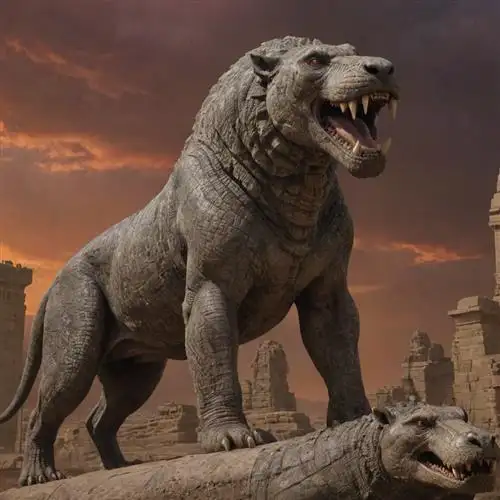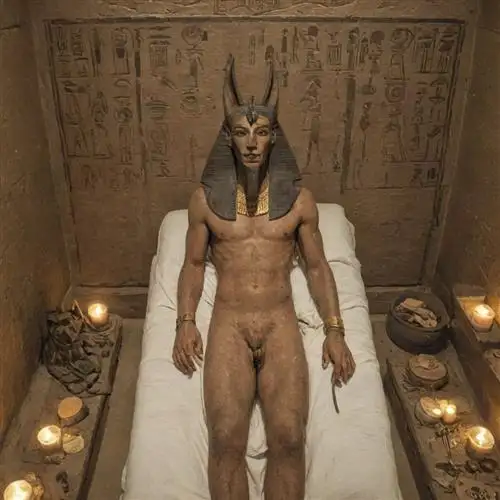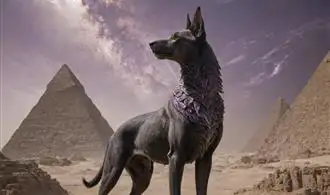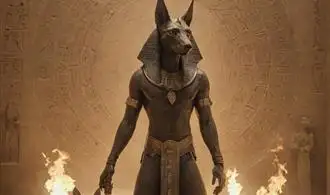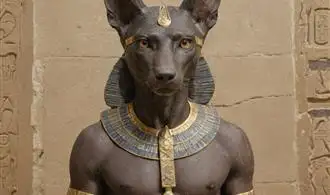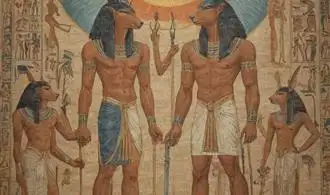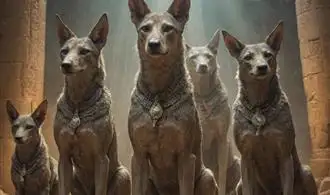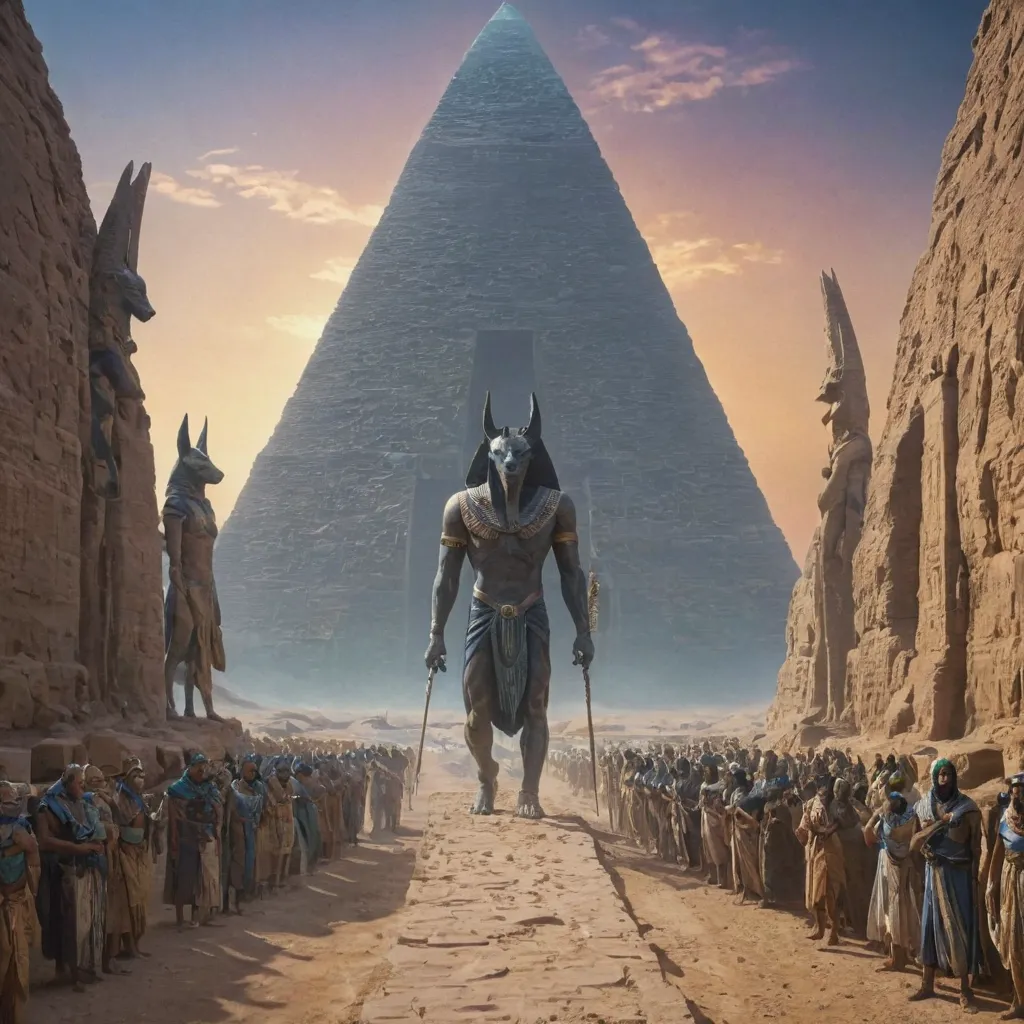
Anubis Presides Over the Weighing of the Heart
In ancient Egyptian mythology, Anubis was the god who presided over the ritual of the Weighing of the Heart, a critical step in the journey of the deceased into the afterlife. This solemn ceremony determined the fate of the soul, serving as the final judgment before the deceased could pass into the realm of the dead.
The Weighing of the Heart was a pivotal moment in the Egyptian concept of the afterlife. The deceased's heart was placed on one side of a scale, while the feather of Ma'at, the goddess of truth and justice, was placed on the other. The heart was weighed against the feather, symbolizing the balance between the individual's deeds and the eternal principles of truth and righteousness.
Anubis, the jackal-headed god, was the overseer of this sacred ritual. As the god of embalming and the protector of the dead, Anubis was responsible for guiding the soul through the treacherous journey to the underworld and ensuring the proper execution of the Weighing of the Heart ceremony.
The heart was believed to be the repository of the individual's soul, memories, and moral character. If the heart was found to be pure and in harmony with the principles of Ma'at, the deceased was deemed worthy of passing into the afterlife. However, if the heart was found to be heavy with sin or corruption, it would be devoured by the devourer, a monstrous creature with the head of a crocodile, the body of a lion, and the hindquarters of a hippopotamus.
The consequences of the Weighing of the Heart were profound. A heart that failed the test would result in the complete annihilation of the soul, denying the deceased the opportunity to continue their journey into the afterlife. This belief instilled a deep sense of personal responsibility and the importance of living a virtuous life in ancient Egyptian society.
The Devouring of the Unworthy
Anubis, the jackal-headed deity of the ancient Egyptian pantheon, was believed to play a crucial role in the afterlife. One of his primary responsibilities was the judgment of the dead, a process that determined the fate of the soul. At the heart of this judgment was the concept of the "devouring of the unworthy," a sobering and often misunderstood aspect of the Egyptian beliefs about the afterlife.
The devouring of the unworthy was a consequence reserved for those whose hearts were deemed too heavy with sin to pass the final test. During the weighing of the heart ceremony, the deceased's heart was placed on the scales of justice, where it was measured against the feather of Ma'at, the goddess of truth and balance. If the heart was found to be heavier than the feather, it was deemed unworthy, and Anubis would then devour the soul, effectively destroying it and consigning the individual to eternal oblivion.
This punishment was not taken lightly, as the ancient Egyptians believed that the afterlife was a realm of eternal existence. The prospect of being erased from existence entirely was a fate worse than death itself. The devouring of the unworthy was, therefore, a profound and terrifying consequence for those who had failed to live a righteous life.
Anubis, as the gatekeeper of the afterlife, played a crucial role in this process. He was responsible for guiding the deceased through the various stages of the judgment, ensuring that the heart was weighed with the utmost care and precision. His presence was a constant reminder of the gravity of the situation, as the individual's entire existence hung in the balance.
The concept of the devouring of the unworthy also had broader implications for the ancient Egyptian worldview. It reflected the belief that there were consequences for one's actions, and that the afterlife was a realm of cosmic justice. The fear of being consumed by Anubis was a powerful motivator for the living to strive for a life of virtue and moral uprightness.
The Unending Torment of the Damned
In the dark and foreboding realm of the Egyptian afterlife, Anubis, the jackal-headed god, presides over the fate of the deceased. While some may find solace in the promise of eternal rest, the truth is far more grim for those deemed unworthy. The souls of the damned are subjected to an unending torment, a punishment that echoes the weight of their transgressions in life.
At the heart of this torment lies the process of the Weighing of the Heart, a crucial step in the journey to the afterlife. As the deceased stands before Anubis, their heart is placed on a scale, balanced against the feather of Ma'at, the embodiment of truth and justice. If the heart is found to be heavier, weighed down by the burden of sin, the soul is condemned to an eternity of suffering.
The fate of the damned is a harrowing one. They are condemned to wander the vast and desolate landscapes of the underworld, forever seeking respite from the unrelenting anguish that consumes them. The scorching sands and unyielding darkness of this realm serve as a constant reminder of their failings, a torment that knows no end.
But the torment of the damned is not limited to the physical. Their very essence is torn asunder, their souls stripped bare and subjected to the merciless gaze of Anubis. The jackal-headed god, in his infinite wisdom, delves into the darkest recesses of the condemned's psyche, exposing the true nature of their transgressions and the depths of their moral depravity.
The Mummification Process and the Role of Anubis
Anubis, the ancient Egyptian god associated with the afterlife, played a crucial role in the mummification process - a sacred ritual that transformed the deceased into an eternal being. As the god of embalming and the protector of the dead, Anubis oversaw every step of this intricate procedure, ensuring the deceased's successful transition to the afterlife.
The mummification process was a meticulously planned and executed ritual that could take several weeks to complete. It involved the removal of the internal organs, the desiccation of the body, and the careful wrapping of the remains in linen bandages. Anubis, with his jackal-like head, was responsible for guiding the embalmers through this complex task, ensuring the preservation of the body and the soul.
One of the critical steps in the mummification process was the removal of the brain and internal organs. Anubis, as the god of the afterlife, would oversee the extraction of these parts, which were then placed in special canopic jars. This step was essential, as the ancient Egyptians believed the organs were integral to the person's continued existence in the afterlife.
After the removal of the internal organs, the body would be carefully dried using a special salt called natron. This process, known as desiccation, could take several weeks to complete. Anubis, as the protector of the dead, would watch over the body during this delicate stage, ensuring the successful preservation of the physical remains.
Once the body had been desiccated, the embalmers would begin the process of wrapping the remains in linen bandages. This intricate task was also overseen by Anubis, who ensured the proper placement of amulets and other sacred objects within the wrappings. These items were believed to provide the deceased with protection and sustenance in the afterlife.
The role of Anubis in the mummification process was not limited to the physical aspects of the ritual. As the god of the afterlife, Anubis was also responsible for guiding the deceased through the transition to the afterlife. He would accompany the soul on its journey, ensuring the safe passage to the realm of the dead and the successful integration into the afterlife.
The Journey of the Soul and the Guardians of the Afterlife
The Journey of the Soul and the Guardians of the Afterlife is a crucial aspect of understanding the complex and often misunderstood mythology surrounding Anubis, the Egyptian god of the dead. Anubis was believed to be the guide and protector of souls as they embarked on their final journey through the afterlife, ensuring a safe passage for the deceased.
At the heart of this belief was the notion of the weighing of the heart, a symbolic representation of the judgment of the soul. Anubis, as the jackal-headed god, was tasked with overseeing this process, where the deceased's heart was weighed against the feather of Ma'at, the goddess of truth and justice. This delicate balance determined the fate of the soul, whether it would be welcomed into the afterlife or condemned to eternal oblivion.
The guardians of the afterlife, often depicted as hybrid creatures or personifications of various aspects of the Egyptian pantheon, played a crucial role in this journey. These entities, such as the Ammit, the devourer of the unworthy souls, or the Ennead, the nine deities who presided over the otherworldly realm, were believed to test the deceased's worthiness and ensure the proper transition of the soul.
The process of mummification, a central practice in ancient Egyptian funerary rites, was also intimately connected to the journey of the soul. The careful preservation of the physical body was seen as a necessary step to ensure the soul's safe passage and eventual reunification with the corporeal form in the afterlife.
Moreover, the placement of amulets, talismans, and various funerary objects within the tomb was believed to provide the deceased with the necessary protection and provisions for their journey through the afterlife. These items, imbued with symbolic meaning and magical properties, were intended to aid the soul in navigating the treacherous pathways of the underworld.


